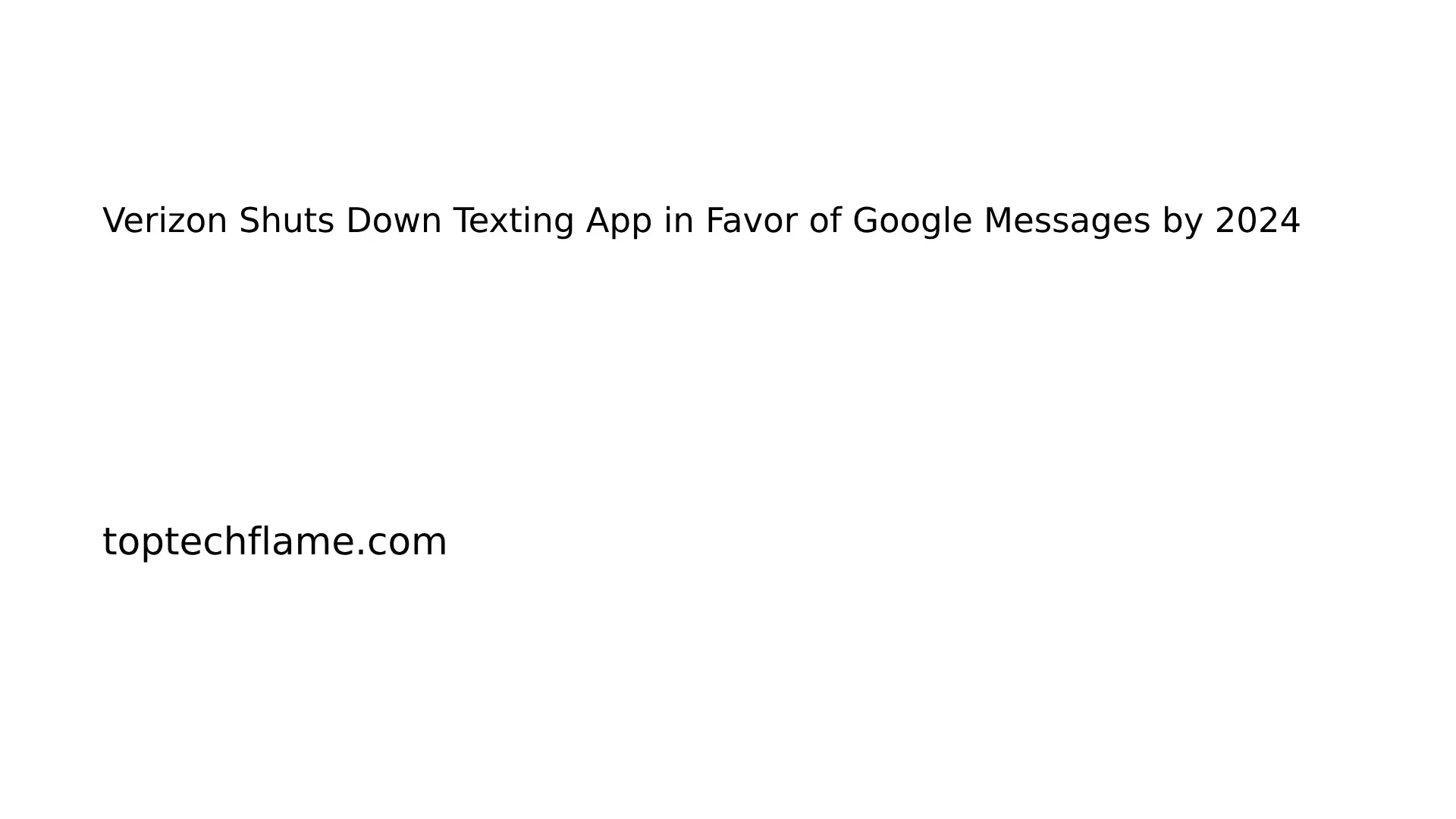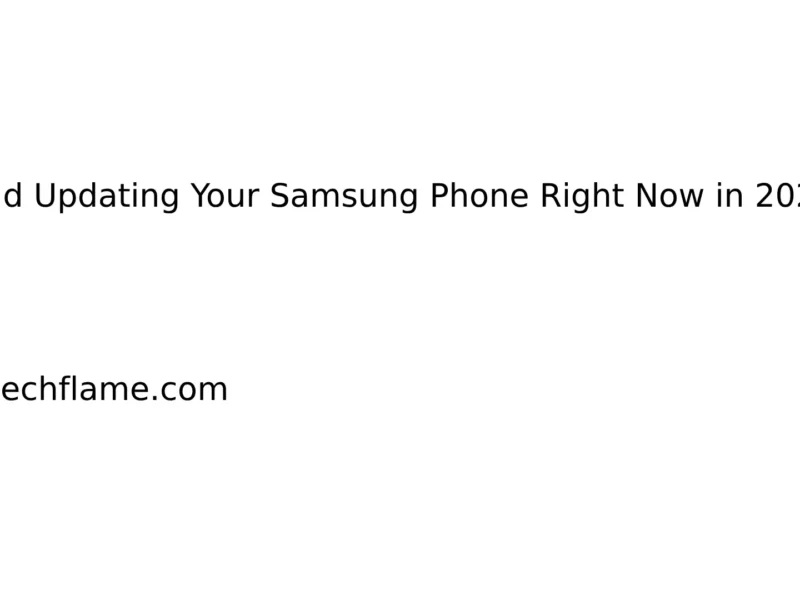Verizon
Verizon recently joined other big companies in a major shift towards consolidating messaging platforms as it signaled its intention to close the Verizon texting application and migrate the clients to Google Messages by January 2024. This moves obvious shows the plan of the telecom giant in simplifying the service in a bid to improve usability and integration with social platforms like Google’s messaging app.
This is no ordinary upgrade and instead should be seen as a change in course to align itself with the emerging trends in mobile messaging and relying on more than simply the text message model of SMS. With this shift, Verizon intends on utilizing the features of Google Messages to deliver a far superior, versatile, and secured messaging platform for its users.
The Evolution of Messaging at Verizon
Since a long time, which is a major mobile network operator in the United States, has kept its own messenger. Firstly, the application was introduced as an SMS and MMS only application. But as the Smartphone technology came into play, users started expecting more and more in terms of operational features like RCS, End to end encryption etc. and inter-operability between different platforms.
This branding app did evolve over the years, however, and had some added sophisticated functionalities for communication but never matched up to apps like iMessage, WhatsApp or Google Messages. By the year 2024, the company came to understand that owning a dedicated platform was expensive and may provide a less efficient experience to the users.
Since RCS evolved to the standard for texting that integrated features like read receipts, typing indication, high resolution media sharing, and group chat management, it became clear that the internal solution Verizon was offering could not compete with today’s offering comparable to competitors.
On the other hand, Google Messages has emerged as the main RCS app with the support of Android-based devices all around the world and offering an experience that Verizon itself could not offer with its exclusive app.
Why Verizon Chose Google Messages
The rationale for Verizon to close its own messaging app and joins the team with Google Messages is as follows. First, there is an extension of first-quality services from Google and improving the element, as seen in the case of RCS messaging platform. Verizon will thus sign its clients up to Google Messages, which will make sure that the clients are settled on a feature full, reliable and ubiquitous application that is already an integral part of Android.
Secondly, Google Messages gives a single messaging service that is fully integrated with almost all Android devices. Since Verizon services millions of android clients across the country, the use of a platform that cuts across all the machines in the market reduces on fragmentation and all their clients across the country are offered an equal experience regardless of the machine that they are using.

Verizon Shuts Down Texting App in Favor of Google Messages by 2024
The third aspect to consider is the growing concern with multiplicity of devices and device heterogeneity. Google Messages a completely immersed into Google’s environment so the users have an ability to view their messages not only on the smartphones, but on the tablets, smart watches, personal computers etc. Verizon, on the other hand, could not achieve the same degree of device compatibility with its application and it was perceived more and more as a simple instrument by tech-savvy clients.
Lastly, there is a constantly developing question of security and privacy enhancements. As the battle for the future of weeping and encryption tools became popularized in communication platforms for both consumer and business correspondence, Verizon Heraldry business felt the need to up the security and protection of its own application.
Google Messages already has end-to-end encryption for direct one-on-one communication over RCS and is constantly improving the delivery of encryption to group messaging as well. Presumably, Verizon realized the sheer enormity and expense of undertaking its own initiatives in building up a rather more sophisticated set of encryption methodologies that Google was proposing for cooperation.
The Impact on Verizon Customers
Verizon’s decision to shut down the messaging app will affect millions of users, and the company has tried to make the process easy. Android customers of Verizon will be led to Google Messages with comprehensive message transferring process to make clients transfer chat histories and media.
In its broadest sense, this shift is viewed by most customers as being a net benefit. By the time the change is implemented, many Verizon users already use Google Messages as their default messaging application, and therefore the shift should be unnoticeable for them.
For those who are currently utilizing the proprietary application developed by Verizon, the change is an excellent chance for switching to a more powerful platform with increased performance, stability, and potential functionality.
Indeed, to some users, changing to Google Messages may be unnoticeable since the application comes preinstalled on many Android gadgets in the recent past. The loss will be the greatest for users who had formerly relied on Verizon native app, especially they would have gotten some optional personalization’s or customized additions.
As to the application migration, which may be to a less tech-savvy user inconvenient, Verizon has agreed to provide extensive customer support while transitioning from one app to another. Special guides along with customer support will be available to help with the setup and migration at this company.
Broader Industry Implications
That Verizon has decided to let go of its proprietary messaging app is symptomatic of developments occurring across the telecommunications landscape. As more carriers rely on physical assets, data, and connectivity, most are no longer content with supporting disconnected services, especially those that demand fresh touches such as music and messaging app providers.
Verizon has closed its app, and this is one of the moves in the never-ending process of convergence of the messaging platforms. Instead of developing and then supporting unique native apps, carriers such as Verizon are selecting to partner with worldwide technology titans who are reaping significant rewards and who have cultivated mass popularity applications.
This strategy has enabled carriers to concentrate on strengths that define them and which the public can implicitly understand and appreciate such as network speeds and coverage while the software and interface that defines the user experience such as Google search engine can be left for independent software companies.
Speaking of the industry perspective, the actions of Verizon may also encourage other key mobile carriers to reconsider their approaches to messaging services. Other big companies such as AT&T and T-Mobile have their own customized messaging apps, and given Verizon’s decision, it may very well put pressure on these other competitors to do the same.
Besides, SCI is expected to be replaced by RCS as an international model at a faster rate going forward as well. Considering both Google and Verizon are promoting Google Messages, it may be that other carriers could feel compelled to support RCS universally and provide a unified messaging platform. This could in a way improve interaction between Android and iOS users if apple finally adopts RCS on iMessage.
Verizon Focus on Innovation
Even though they are shutting down their messaging app, which looks like a step back; in the long-term plan, that is not the case because Verizon has shifted focus to invest in areas in the future that need focus, the areas that count.
Verizon has been on the forefront in deployment of 5G technology and has been involved in enhancement of mobile network. That is why by outsourcing this task or rather shifting to Google technologies to maintain a messaging application, Verizon can focus on other aspects distinguished by competitive edge.
This also correlates with Verizon’s additional strategic direction that aims it to become a more of a tech company that consolidates its cooperation to provide the best services. Verizon and Google have previously worked together in different capacities such as push towards the integration of 5G in Google’s Pixel phones and on cloud gaming and edge compute projects.
The reason of the company focusing more on the networks and new generation technology than on the applications is justified by the new paradigm in the telecommunication industry. Over time, apps are also emerging as critical platforms, and to compete hard into the future, legacy carriers like Verizon are opting not to reinvent the wheel but to team with other more traditional technology players.
The Future of Messaging
RCS is becoming the future of messaging, especially for Verizon, and platforms such as Google Messages. As the clients transfer from the old service provider, the following are exhibiting extra perk highlights commonplace today, portraying palms, group messages, and encryption.
From the current APP design, there is also possible growth in the messaging space is given that APP is only in its initial stages. Google Messages is still under development, with latest features being deployed from time to time, to enhance user experience.
It is also making a connection to Google Assistant, which means writing messages, for instance, can be done without hands. This combination with the AI tools may become larger in the future, improving the created messengers’ functionality in comparison with standalone applications of the carriers, such as Verizon.
Moreover, choosing RCS by the carriers such as Verizon initiates the period that depends on the further standardization of the messaging applications among the platforms and devices. I see this shift could cut down the rivalry that has, for years, been the battle between Android and iOS, mainly because RCS offers many of the offerings that make use of iMessage so popular.
Conclusion
The recent Verizon’s move of pulling out its messaging app and switching to Google Messages by 2024 is a turning point for the telecommunication industry. This decision is visionary as Google’s RCS (Rich Communication Services) platform is more suitable for the dynamics of current mobile communication.
Since RCS has now become the norm, Google Messages provides the features that modern smartphone user desires include support for rich media messaging, end-to-end encrypted messaging and the new powerful messaging on Google chat for group. Through this change, Verizon is trying to align it is to its customers and is responding to the new trend and development in the digital communication front.
The switchover to Google Messages reflects that Verizon users will get to experience the advantages of a more secure and improved messaging service. Google messaging is compatible with end-to-end encrypted communication, sharing of high-quality media and real-time features such as last-seen status and typing status are also interesting features of Google’s messaging app.
Verizon realized that its own app could not evolve at the same pace as the messaging platforms developed over the past few years, such as iMessage and WhatsApp. In migrating to the highly present and efficient messaging platform of Google, Verizon outdoes itself on the problems of creating and or sustaining its own application while improving on the existing functionality of the messaging structure for the benefit of the user.
This changeover is not just that from a software package; it is a strategic move that brings Verizon into congruence with the trends that are evident in the market currently. There is also a general trend towards the integration of messengers, and the growing number of dependences on major IT companies by carriers.
It became increasingly unfeasible to preserve proprietary applications like Verizon since customers’ demands keep increasing and cost elevate investing in amity and security. Google search is easily available and updated constantly, meaning Verizon users are given a ubiquitous and constantly updated experience.
Google has shifted focus to the use of RCS technology as one of the chief causes of the change. RCS has already come forward as the upgrade to the classic SMS, with features that deepen the interaction and experience significantly. Practical uses such as files transfer, high resolution pictures, video message and other advanced features in group messaging make RCS as a perfect picture of mobility of the future.
Google Messages is one of the platforms that have adopted this standard currently serving as an example of how this standard can be integrated into the regular usage of a smartphone which in this case is very suitable for Verizon as the provider seeks to make available to its consumers a modern means of communication.
A third important aspect in the Verizon decision is what can be referred to as security. Today’s messaging apps should offer end-to-end encryption for privacy, and Google Messages do so, but only for one-on-one communication.
As privacy factors emerged the major issue, mainly with the rise of cyber threats, it became crucial for Verizon to bring out the enhanced solution for data security. By migrating to Google Messages, Verizon users will get Google’s constant investment in security, especially of their messages, and in privacy of their communications.
Similarly for Verizon, the move to Google Messages also provides the company an opportunity to work on its competencies which include the network infrastructure, and 5G technology. Verizon has been at the forefront of delivering 5G services with a lot of effort being made to construct the high-speed network.
Thus, leaving the management of the messaging services to Google will be beneficial to Verizon in the sense that the company can direct attention and focus to its strategic business areas and at the same time make sure that the current networks it provides is among the best in the industry now.
Moreover, it is also enveloped in a general phenomenon of the telecommunications industry whereby service providers are seeking to have mutually beneficial business relations with IT giants. Verizon is one of those carriers that enter partnership with technology companies such as Google to deliver better experience to users. Such collaborations will become more frequent as communication services become more complex and require increased specific work. Verizon can develop infrastructure, relying on tech giants to work on software.
When this change is being embraced by Verizon the millions of consumers using its messaging services will be introduce to a new age of the communication. These will be a change to Google Messages which will give them a platform that consolidates security, additional features, and cross-device compatibility in a convenient, unified package.
Verizon recently decided to discontinue its proprietary app, weird for some users to adjust but this change opens the world for a better integrated technological messaging system for communicators. With 2024 now looming this must be seen as a major step forward not just for Verizon themselves but for the development of messaging throughout the mobile environment.


